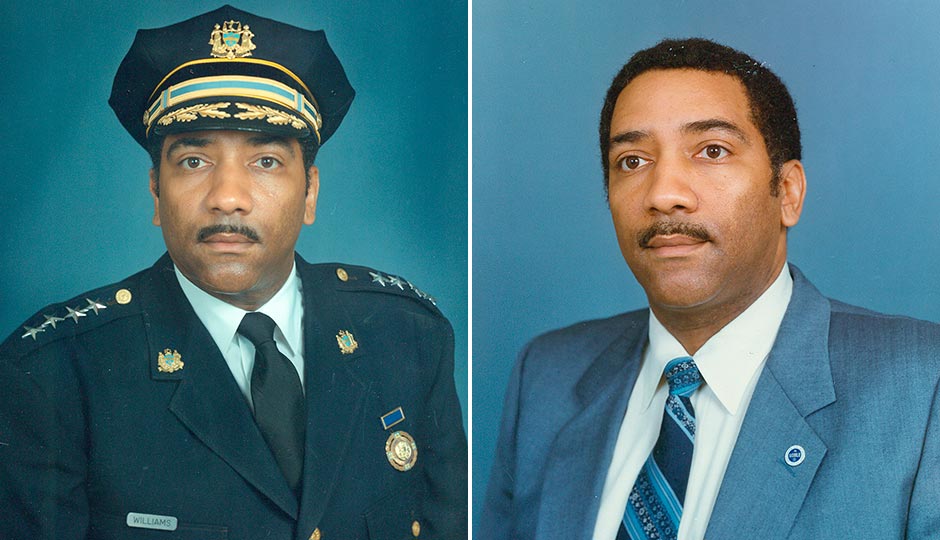Willie Williams, Philly’s First African-American Police Commissioner, Has Died at 72

Willie Williams. Photos | Philadelphia Police Department
Sylvester Johnson‘s memories of Willie Williams stretch back 50 years, to a time when both men were young Philly cops, working for a Police Department that wasn’t exactly bending over backward to create opportunities for African-Americans.
The two men lived around the corner from each other. When promotional exams rolled around, they huddled together and studied, hoping like hell they’d do well enough to have a crack at moving up a rank. Williams climbed the ranks a little faster than Johnson, but didn’t forget his friend. “He was the one who made me a captain, and then made me an inspector,” Johnson said. “He was a mentor to me, and to a lot people.”
Johnson rummaged through these and other memories on Wednesday afternoon, just hours after he learned that Williams had died in Atlanta at age 72, following a lengthy illness. Williams was a trailblazer who will go down in history as the first African-American man to serve as police commissioner in Philadelphia and Los Angeles.

Willie L. Williams,, then Los Angeles Police Chief, in his office on March 30, 1995.
Then-Mayor Wilson Goode Sr. made Williams the city’s top cop in 1988, when the city was just a few years removed from the civic nightmare of the MOVE bombing. “I was a lieutenant on the mayor’s detail when he was made commissioner,” Johnson said. “We were all very happy and proud of that. He opened a lot of doors, especially for African-Americans.”
His presence loomed large, even in the minds of young cops. John McNesby, the president of the Fraternal Order of Police Lodge No. 5, was fresh out of the police academy when Williams took over the department. “He was just well-respected and a cop’s cop,” McNesby said. “I know when I got to the district that I was assigned to, nobody ever had a bad word to say about him. He led his troops the way it should be done.”
Police Commissioner Richard Ross was also a rookie cop at the time. He met Williams, and felt his career ambitions suddenly come into focus. “He was my inspiration, early on,” Ross said. “He truly gave me the belief that I could go on to [become commissioner] one day. When you think of Chuck Ramsey‘s reputation now, that was Willie Williams back then.”
Williams’s focus on building strong community relations caught the attention of the civilian board that runs the Los Angeles Police Department in the wake of the Rodney King beating, and the riots that consumed the city after four cops who were videotaped beating King were acquitted of criminal charges. The board hired Williams in 1992 to reform the LAPD, which faced relentless scrutiny. “I was happy when he went to Los Angeles, because you could see what the blueprint was. You realized your life was not over once you reached the pinnacle in your particular department,” Ross said.
But the transition to the West Coast wasn’t exactly smooth. Williams was the first outsider to run the police department in decades, said Joe Domanick, an investigative reporter and author whose most recent book, Blue: The LAPD and the Battle to Redeem American Policing, chronicles the chaos of the early ’90s and the reforms that weren’t fully realized until New York Police Commissioner William Bratton took over the LAPD in 2002.
“He was really welcomed with open arms, from the editorial board of the Los Angeles Times down to the folks on the street, and he made an enormously good impression initially, because he was an easy, casual guy,” Domanick said. “He knew how to talk the talk and say all the right things. But he had no idea about how to reform the LAPD.”
Veteran LA cops recoiled at the idea of an outsider — from Philadelphia, no less — coming in and changing the department. Williams had few allies, Domanick said, and was distrustful of those who orbited the department. “Politics has greatly intruded, for the right or the wrong reasons, into the day-to-day management activities of the Los Angeles Police Department,” Williams told the Times after his tenure ended in 1997.
Williams’s son, also named Willie Williams, is a Philadelphia police lieutenant who serves on Mayor Jim Kenney‘s security detail. “I am deeply saddened to learn of Willie Williams’ passing. He served this city with greatness, improving community police relations and breaking down barriers as Philadelphia’s first African-American Commissioner,” Kenney said in a statement. “It was privilege to know him and his family, who continue to carry on his legacy of service. My thoughts and prayers are with his loved ones.”
Ross said Williams’s son was his partner years ago on an anti-crime team. “My heart goes out to their entire family.” Johnson said he was shocked to hear that Williams has died. He thought back to the ambitious man he grew up with all those years ago. “What stands out is his charisma, his sincerity and his compassion towards people, and his commitment to the police department and his family,” Johnson said. “He helped a lot of people.”
Follow @dgambacorta on Twitter.


